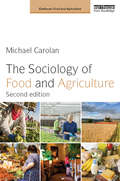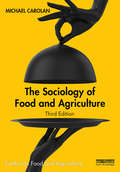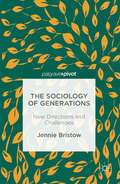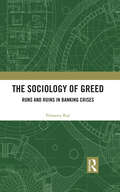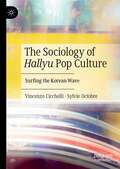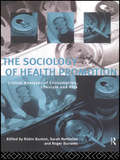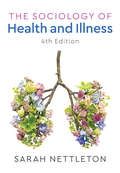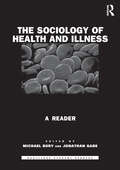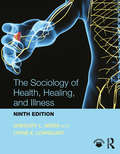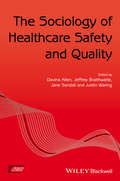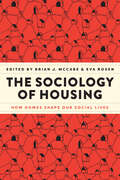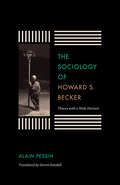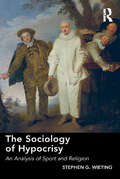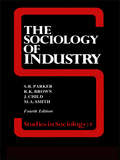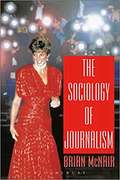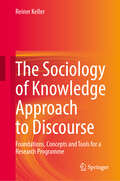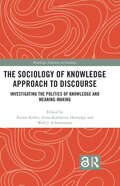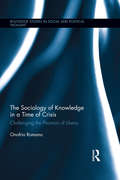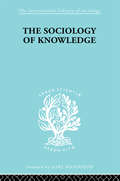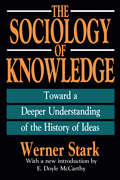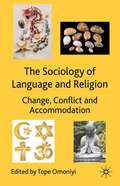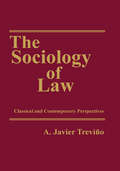- Table View
- List View
The Sociology of Food and Agriculture
by Michael CarolanIn this second edition of The Sociology of Food and Agriculture, students are provided with a substantially revised and updated introductory text to this emergent field. The book begins with the recent development of agriculture under capitalism and neo-liberal regimes, and the transformation of farming and peasant agriculture from a small-scale, family-run way of life to a globalized system. Topics such as the global hunger and obesity challenges, GM foods, and international trade and subsidies are assessed as part of the world food economy. The final section concentrates on themes of sustainability, food security, and food sovereignty. The book concludes on a positive note, examining alternative agri-food movements aimed at changing foodscapes at levels from the local to the global. With increased coverage of the financialization of food, food and culture, gender, ethnicity and justice, food security, and food sovereignty, the book is perfect for students with little or no background in sociology and is also suitable for more advanced courses as a comprehensive primer. All chapters include learning objectives, suggested discussion questions, and recommendations for further reading to aid student learning.
The Sociology of Food and Agriculture (Earthscan Food and Agriculture)
by Michael CarolanThoroughly revised and updated, the third edition of The Sociology of Food and Agriculture provides a cutting-edge, comprehensive introduction to the study of food and society. The book begins by examining the food economy, with chapters focusing on foodscapes, the financialization of food, and a new chapter dedicated to food and nutrition (in)security. In Part II, the book addresses community and culture. While some books only look at the interrelationships between food and culture, this section problematizes the food system from the standpoint of marginalized bodies. It contains chapters focusing on agricultural and food labor and the peasantries, topics which are often overlooked, and gender, ethnicity, and poverty. Part III examines food and the environment, with chapters addressing important topics such as agro-ecosystems, food justice, sustainable food, and agriculture and food sovereignty. The final part focuses on food futures and includes a brand-new chapter on sustainable diets and ethical consumption. The book concludes by showcasing how we can rethink food production and consumption in a way that can help heal social, political, and cultural divisions. All chapters draw on international case studies and include learning objectives, suggested discussion questions, and recommendations for further reading to aid student learning. The Sociology of Food and Agriculture is perfect for students of food studies, including food justice, food and nutrition security, sustainable diets, food sovereignty, environmental sociology, agriculture, and cultural studies.
The Sociology of Generations
by Jennie BristowThis book suggests that the enduring problem of generations remains that of knowledge: how society conceptualises the relationship between past, present and future, and the ways in which this is transmitted by adults to the young. Reflecting on Mannheim's seminal essay 'The Problem of Generations', the author explores why generations have become a focus for academic interest and policy developments today. Bristow argues that developments in education, teaching and parenting culture seek to resolve tensions of our present-day risk society through imposing an artificial distance between the generations. Bristow's book will be of interest to students and scholars in the fields of Sociology, Social Policy, Education, Family studies, Gerontology and Youth studies.
The Sociology of Greed: Runs and Ruins in Banking Crises
by Prasanta RayThe Sociology of Greed examines crises in financial institutions such as banks from the vantage point of the greed of the people at their helm. It offers an intensive analysis of the banking crises under the conditions of colonial capitalism in early twentieth-century Bengal that led to institutional and social collapse. Breaking new ground, the book looks at the moral economy of capitalism and money culture by focusing on the victims of banking crises, hitherto unexplored in Western empirical research. Through sociological analyses of political economy, it seamlessly combines archival records, survey and statistical data with literary narratives, realist fiction and performing arts to recount how the greed of bank owners and managers ruined their institutions as well as common people. It argues that greed turns perilous when the state and the market facilitate its agency, and it examines the contexts and histories, the indifference of the fledgling colonial state, feeble political response, and the consequences for those who were impacted and the losses, especially the refugees, the lower-middle class and women. The volume also re-composes relevant elements of Western sociological scholarship from classical theories to early twenty-first-century financial sociology. An insightful account of the social history of banking in India, this book will greatly interest researchers and scholars in sociology, economics, history and cultural studies.
The Sociology of Hallyu Pop Culture: Surfing the Korean Wave
by Vincenzo Cicchelli Sylvie OctobreCombining global, media, and cultural studies, this book analyzes the success of Hallyu, or the "Korean Wave” in the West, both at a macro and micro level, as an alternative pop culture globalization. This research investigates the capitalist ecosystem (formed by producers, institutions and the state), the soft power of Hallyu, and the reception among young people, using France as a case study, and placing it within the broader framework of the 'consumption of difference.' Seen by French fans as a challenge to Western pop culture, Hallyu constitutes a material of choice for understanding the cosmopolitan apprenticeships linked to the consumption of cultural goods, and the use of these resources to build youth’s biographical trajectories. The book will be relevant to researchers, as well as undergraduate and postgraduate students in sociology, cultural studies, global studies, consumption and youth studies.
The Sociology of Health Promotion: Critical Analyses of Consumption, Lifestyle and Risk
by Sarah Nettleton Robin Bunton Roger BurrowsPromotion of health has become a central feature of health policy at local, national and international levels, forming part of global health initiatives such as those endorsed by the World Health Organisation. The issues examined in The Sociology of Health Promotion include sociology of risk, the body, consumption, processes of surveillance and normalisation and considerations relating to race and gender in the implementation of health programmes. It will be invaluable reading for students, health promoters, public health doctors and academics.
The Sociology of Health and Illness
by Sarah NettletonSarah Nettleton’s The Sociology of Health and Illness has become a cornerstone text, popular with students and academics alike for its rigorous and accessible overview of the field. Building on these strengths, the fourth edition integrates fresh insights from the current literature with the core tenets of traditional medical sociology, providing students with a thorough grounding in the sociology of health and illness. The text covers a diversity of topics and draws on a wide range of analytic approaches, spanning issues such as the social construction of medical knowledge, the analysis of lay health beliefs, concepts of lifestyles and risk, the experience of illness and the sociology of the body. It also explores matters that are central to health policy, such as professional–patient relationships, health inequalities and the changing nature of health care work. A new chapter has been added, on the sociology of mental health; other chapters have been updated with illustrative examples and questions for discussion. Written for students of the social sciences, this book will also appeal to students taking vocational degrees, such as nursing, medicine and public health, who require a sociological grounding in the area. Thoroughly revised and fully updated, this fourth edition will prove invaluable to anyone looking for a clear and engaging introduction to contemporary debates within the sociology of health and illness.
The Sociology of Health and Illness: A Reader (Routledge Student Readers)
by Michael Bury Jonathan GabeA wide-ranging collection of both classic writings and more recent articles in the sociology of health and illness, this reader is organized into the following sections: * health beliefs and knowledge* inequalities and patterning of health and illness* professional and patient interaction* chronic illness and disability* evaluation and politics in health care. With a thorough introduction which sets the scene for the field as a whole, and section introductions which contextualize each chapter, the reader includes a number of different perspectives on health and illness, is international in scope, and will provide an invaluable resource to students across a wide range of courses in sociology and the social sciences.
The Sociology of Health, Healing, and Illness
by Gregory Weiss Denise CopeltonWith thorough coverage of inequality in health care access and practice across the field it surveys, The Sociology of Health, Healing, and Illness is widely acclaimed by instructors as the most comprehensive of any available. Written in an engaging and accessible style, with multiple student-friendly features, it integrates and contextualizes recent research in medical sociology and public health to introduce students to a wide range of issues affecting health, healing, and health care today.This new edition links information on COVID-19 into each chapter, providing students with timely and familiar examples to deepen their understanding of the many social dimensions of health care, such as the social history of medicine, social epidemiology, social stress, health and illness behavior, the medical profession, nurses and allied health workers, complementary and alternative medicine, the physician-patient relationship, medical ethics, and the financing and organization of medical care.Important changes and enhancements to this eleventh edition include: A heightened focus on social disparities in race, class, gender, and sexual identity, addressing how these differences impact health outcomes in the United States and why Updates to the boxed sections that explore topics “In the Field” and “In Comparative Focus,” sparking readers’ curiosity and drawing their attention to topics such as medical education and student debt, as well as the continuities and differences in health care and public health issues across time and space Thorough examination of newer perspectives and developments in the field, including the issue of nurse and physician burnout during the COVID-19 pandemic, quality concerns in nursing homes, and the inner workings of health care systems in other parts of the world Improved support materials for instructors, featuring updated exam questions and lecture slides that correspond to the book’s newer content Altogether, the new edition of The Sociology of Health, Healing, and Illness maintains the foundational coverage of the field that the book is well known for and enriches its presentation with considered attention to contemporary patterns, perspectives, and research – perfect for introducing readers to the important and tremendously meaningful issues studied by medical sociologists.
The Sociology of Health, Healing, and Illness
by Lynne E. Lonnquist Gregory L. WeissWith thorough coverage of inequality in health care access and practice, this leading textbook has been widely acclaimed by teachers as the most accessible of any available. It introduces and integrates recent research in medical sociology and emphasizes the importance of race, class, gender throughout. This new edition leads students through the complexities of the evolving Affordable Care Act. It significantly expands coverage of medical technology, end-of-life issues, and alternative and complementary health care—topics students typically debate in the classroom. ?Many new textboxes and enhancements in pedagogy grace this new edition, which is essential in the fast-changing area of health care. New to this Edition *More textboxes relating the social aspects of medicine to students' lives *Expanded coverage leading students through the complex impacts of the ACA and health care reform? *Expanded coverage of medical technology, end-of-life issues, and alternative and complementary health care? *'Health and the Internet' sections updated and renovated toward student assignments? *New, end of chapter lists of terms *Updated test bank
The Sociology of Healthcare Safety and Quality
by Jeffrey Braithwaite Jane Sandall Justin Waring Davina AllenThe Sociology of Healthcare Safety and Quality presents a series of research-informed readings on the sociological contributions of technologies, practices, experiences, and organizational quality and safety across a range of healthcare contexts. Represents the first collection of peer-reviewed research articles showcasing ways that sociology can contribute to the ongoing policy concern of healthcare safety and quality Features original contributions from leading experts in healthcare related fields from three continents Reveals the state-of-the art in sociological analyses of contemporary healthcare safety and quality along with future directions in the field Offers sociological insights from the perspectives of managers, clinicians, and patients
The Sociology of Housing: How Homes Shape Our Social Lives
by Eva Rosen Brian J. McCabeA landmark volume about the importance of housing in social life. In 1947, the president of the American Sociological Association, Louis Wirth, argued for the importance of housing as a field of sociological research. Now, seventy-five years later, the sociology of housing has still not developed as a distinct subfield, leaving efforts to understand housing’s place in society to other disciplines, such as economics and urban planning. With this volume, the editors and contributors solidify the importance of housing studies within the discipline of sociology by tackling topics like racial segregation, housing instability, the supply of affordable housing, and the process of eviction. In doing so, they showcase the very best traditions of sociology: they draw on diverse methodologies, present unique field sites and data sources, and foreground a range of theoretical approaches to elucidate the relationships between contemporary housing, public policy, and key social outcomes. The Sociology of Housing is a landmark volume that will be used by researchers and students alike to define this growing subfield, map continued directions for research, and center sociologists in interdisciplinary conversations about housing.
The Sociology of Howard S. Becker: Theory with a Wide Horizon
by Steven Rendall Alain PessinHoward S. Becker is a name to conjure with on two continents —in the United States and in France. He has enjoyed renown in France for his work in sociology, which in the United States goes back more than fifty years to pathbreaking studies of deviance, professions, sociology of the arts, and a steady stream of books and articles on method. Becker, who lives part of the year in Paris, is by now part of the French intellectual scene, a street-smart jazz pianist and sociologist who offers an answer to the stifling structuralism of Pierre Bourdieu. French fame has brought French analysis, including The Sociology of Howard S. Becker, written by Alain Pessin and translated into English by Steven Rendall. The book is an exploration of Becker’s major works as expressions of the freedom of possibility within a world of collaborators. Pessin reads Becker’s work as descriptions and ideas that show how society can embody the possibilities of change, of doing things differently, of taking advantage of opportunities for free action. The book is itself a kind of collaboration—Pessin and Becker in dialogue. The Sociology of Howard S. Becker is a meeting of two cultures via two great sociological minds in conversation.
The Sociology of Hypocrisy: An Analysis of Sport and Religion
by Stephen G. WietingWith close attention to the spheres of sport and religion as important sites of moral currency, this book draws on media coverage of major cases of hypocrisy, attending to differing meanings and consequences of hypocrisy within the US, France and Iceland. Instances come from scandals within the established churches, as well as cases from the National Collegiate Athletic Association, the Tour de France, and the inquest into the Hillsborough Disaster in the UK. It considers the importance of the context within which moral conduct takes place and the relevance of this for the occurrence of hypocritical action, while exploring also the implications of advances in computer and information technology for controlling messages and monitoring deceit. Identifying the negative effects of the detection of hypocrisy at individual and institutional levels, the author engages with the work of Goffman to argue for the importance of trust in institutions, underlining the necessity of minimizing and correcting hypocritical acts by which this is undermined. A detailed study of hypocrisy and the need for trust, this volume will appeal to scholars and students of sociology with interests in social and moral conduct, sport, religion, Goffman and the notion of social life as artifice.
The Sociology of Industry (Studies In Sociology Ser. #Vol. 1)
by Richard Brown John Child Dr S ParkerThis book provides an excellent introduction to the sociology of industry. It comprises of three sections, which in turn address: the relation between industry and other sub-systems or institutions in society; the internal structure of industry and the roles people play within that structure; the social actions of individuals and groups within an organisational structure. It is an excellent resource for students of sociology who have an interest in its application to the ‘world of work’.
The Sociology of Intellectuals
by Patrick Baert Simon SusenThis volume offers an unprecedented account of recent and future developments in the sociology of intellectuals. It presents a critical exchange between two leading contemporary social theorists, Patrick Baert and Simon Susen, advancing debates at the cutting edge of scholarship on the changing role of intellectuals in the increasingly interconnected societies of the twenty-first century. The discussion centres on Baert's most recent contribution to this field of inquiry, The Existentialist Moment: The Rise of Sartre as a Public Intellectual (2015), demonstrating that it has opened up hitherto barely explored avenues for the sociological study of intellectuals. In addition, the authors provide an overview of various alternative approaches that are available for understanding the sociology of intellectuals - such as those of Pierre Bourdieu, Randall Collins, and Neil Gross. In doing so, they grapple with the question of the extent to which intellectuals can play a constructive role in influencing social and political developments in the modern era. This insightful volume will appeal to students and scholars of the humanities and social sciences, particularly to those interested in social theory and the history of intellectual thought.
The Sociology of Journalism
by Brian McNairJournalism is a privileged cultural form. It is the main source of our knowledge about the world and our place in it, and the point at which the individual and the social worlds meet. Referring to cases from both the US and UK, including the White House sex scandals and the death of Diana, this book examines the various factors involved in the making of contemporary journalism, including economic and political pressures, changes in the technology of news gathering and production, and the growing role of sources and "source strategies." The text analyzes how such factors come to exert influence on the form, content, and style of journalism, and reviews current approaches to the sociological impact of journalism on individuals, groups, and organizations.
The Sociology of Karl Mannheim: With a Bibliographical Guide to the Sociology of Knowledge, Ideological Analysis, and Social Planning (International Library Of Sociology)
by Gunter Werner RemmlingKarl Mannheim (1893-1947) occupies a prominent position among the leading social scientists of the twentieth century; his ideas and his books are relevant for many issues engaging the concern of sociologists today. Mannheim’s life spanned three cultural traditions – Hungarian, German and British – and in this authoritative study Professor Remmling covers all these phases in his life and work.Mannheim began as an idealistic philosopher, but soon began to make important contributions to the developing area of sociology of knowledge. After his emigration to England in 1933, Mannheim developed a theory of social planning to combat the socio-political consequences of the crisis of liberalism. During the Second World War his attention shifted to the ethical and religious values of Western humanism and the related role of mass education in democratic social planning. Finally, Mannheim forged the rudiments of a political sociology attacking the abuse of politico-military power and the resulting danger of a third world war, while simultaneously calling for counter-attack under the banner of planning for freedom on behalf of militant, fundamental democracy. In tracing these development in Karl Mannheim’s work, Gunter Remmling provides insights into major theoretical and practical issues of the first half of the twentieth century, problems which remain central to the modern experience.A comprehensive bibliography is provided to introduce the sociology of knowledge and related topics, such as ideology, utopia, intellectuals, Weimar culture, and social planning.
The Sociology of Knowledge Approach to Discourse: Foundations, Concepts and Tools for a Research Programme
by Reiner KellerIn this updated version of a contemporary classic of discourse research, Reiner Keller develops the theoretical and methodological foundations of the Sociology of Knowledge Approach to Discourse (SKAD). Translated from the original German into English for the first time, this book brings together two previously unconnected domains of knowledge analysis in social science: the rich traditions of sociology of knowledge and symbolic interactionism on one hand and the works of discourse studies, especially in relation to Michel Foucault, on the other. It presents a critical discussion of key developments in sociology of knowledge, symbolic interactionist, and related interpretive approaches, explains the communicational turn of recent work in the field, and examines how traditions within sociology of knowledge shifted focus or converged over time. Following this, the book discusses the development of discourse theory and discourse analysis since the 1960s, including critical discourse analysis, hegemony analysis, or cultural studies approaches. Embarking from a profound reconstruction of Michel Foucault’s work, the book then sets its own distinctive course by integrating major elements of Foucault’s perspective with the sociology of knowledge. Along this path, Reiner Keller establishes the heuristics and methodology for a sociology of knowledge approach to discourse, providing a comprehensive research programme for the study of social relations of knowledge and politics of knowledge. Since its first publication in 2005, SKAD has informed a multitude of studies worldwide and across several academic disciplines. Today it can be considered as one of the major perspectives in discourse research in social science and beyond.
The Sociology of Knowledge Approach to Discourse: Investigating the Politics of Knowledge and Meaning-making. (Routledge Advances in Sociology)
by Reiner Keller Anna-Katharina Hornidge Wolf J SchünemannThe Sociology of Knowledge Approach to Discourse (SKAD) has reoriented research into social forms, structuration and processes of meaning construction and reality formation; doing so by linking social constructivist and pragmatist approaches with post-structuralist thinking in order to study discourses and create epistemological space for analysing processes of world-making in culturally diverse environments. SKAD is anchored in interpretive traditions of inquiry and allows for broadening – and possibly overcoming – of the epistemological biases and restrictions still common in theories and approaches of Western- and Northern-centric social sciences. An innovative volume, this book is exactly attentive to these empirically based, globally diverse further developments of approach, with a clear focus on the methodology and its implementation. Thus, The Sociology of Knowledge Approach to Discourse presents itself as a research program and locates the approach within the context of interpretive social sciences, followed by eleven chapters on different cases from around the world that highlight certain theoretical questions and methodological challenges. Presenting outstanding applications of the Sociology of Knowledge Approach to Discourse across a wide variety of substantive projects and regional contexts, this text will appeal to postgraduate students and researchers interested in fields such as Discourse Studies, Sociology, Cultural Studies and Qualitative Methodology and Methods.
The Sociology of Knowledge in a Time of Crisis: Challenging the Phantom of Liberty (Routledge Studies in Social and Political Thought #92)
by Onofrio RomanoThe speed of social dynamics has overtaken the speed of thought. Adopting a dialectical perspective towards reality, social theory has always detected faults in the dominant social pattern, foreseeing crises and outlining in advance the features of new social models. Thought has always moved faster than reality and its ruling models, ensuring a dynamic equilibrium during modernity. Despite any dramatic social crisis, theory has always provided exit routes. The tragedy of current crisis lies in the fact that its social implications are exasperated by the absence of alternative views. This book identifies the causes of this mismatch between thought and reality, and illustrates a way out.
The Sociology of Knowledge: An Essay in Aid of a Deeper Understanding of the History of Ideas (International Library of Sociology)
by Stark F. WernerFirst Published in 1998. Routledge is an imprint of Taylor & Francis, an informa company.
The Sociology of Knowledge: Toward a Deeper Understanding of the History of Ideas (International Library Of Sociology Ser.)
by Werner StarkThis volume serves as both an introduction to the field of the sociology of knowledge and an interpretation of the thought of the major figures associated with its development More than a compendium of ideas, Stark seeks here to put order into what he regarded as a diffuse tradition of diverse bodies of thought, in particular the seemingly irreconcilable conflict between the study of the political element in thought identified here with Karl Mannheim and the investigation of the social element in thinking associated with the work of Max Scheler.The sociology of knowledge is primarily directed toward the study of the precise ways that human experience, through the mediation of knowledge, takes on a conscious and communicable shape. While both schools dealt with by Stark assume that the pursuit of truth is not purposeful apart from socially and historically determined structures of meaning, the tradition extending from Marx to Mannheim seeks to expose hidden factors that turn us away from the truth while that of Weber and Scheler attempts to identify social forces that impart a definite direction to our search for itIn order to reconcile opposing theoretical positions, Stark seeks to lay the foundations for a theory of the social determination of thought by directing his inquiry to the philosophical problem of truth in a manner compatible with cultural sociology. Stark's theoretical legacy to the sociology of knowledge is that social influences operate everywhere through a group's ethos. From this, many systems of ideas and social categories emanate, revealing partial glimpses of a synthetic whole.The outcome of Stark's work is a general theory of social determination remarkably consistent with contemporary interests in the broad range of cultural studies, whose focus is best described as the use of philosophical, literary, and historical approaches to study the social construction of meaning. The Sociology of Knowledge will be of great interest to social scientists, philosophers, and intellectual historians.
The Sociology of Language and Religion
by Tope OmoniyiThis is an eclectic collection of essays which successfully demonstrate how the Sociology of Language and Religion as a disciplinary paradigm responds to change, conflict and accommodation. The multiple religious coverage in the essays (Judaism, Christianity, Islam) as well as more or less global panorama.
The Sociology of Law: Classical and Contemporary Perspectives
by A. Javier TrevinoThe purpose of this book is to introduce the sociology of law by providing a coherent organization to the general body of literature in that field. As such, the text gives a comprehensive overview of theoretical sociology of law. It deals with the broad expanse of the field and covers a vast amount of intellectual terrain. This volume is intended to fill a gap in the literature. Most textbooks in the sociology of law are insufficiently theoretical or else do not provide a paradigmatic analysis of sociological theories.The content of this text consists of discussions of the works of scholars who have contributed the most to the cumulative development of the sociology of law. It surveys the major traditions of legal sociology but is not wedded to any one particular theoretical approach. Both the "classical," or nineteenth-century, and "contemporary," or twentieth-century, perspectives are covered. The reader will see that nineteenth-century thought has directly influenced the emergence of twentieth-century theory.One unique feature of this book is that key sociological and legal concepts, presented in bold print and italics, are defined, described, and illustrated throughout. Although the nature of the subject matter is highly theoretical and, at times, quite complex, Trevino values every effort to present the material in the most straightforward and intelligible form possible without compromising the integrity of the theories themselves. In short, this book aims to accomplish three objectives: inform about the progressive advancement of sociological theory, teach the reader to analyze the law as a social phenomenon, and develop in the reader a critical mode of thinking about issues relevant to the relationship between law and society.
